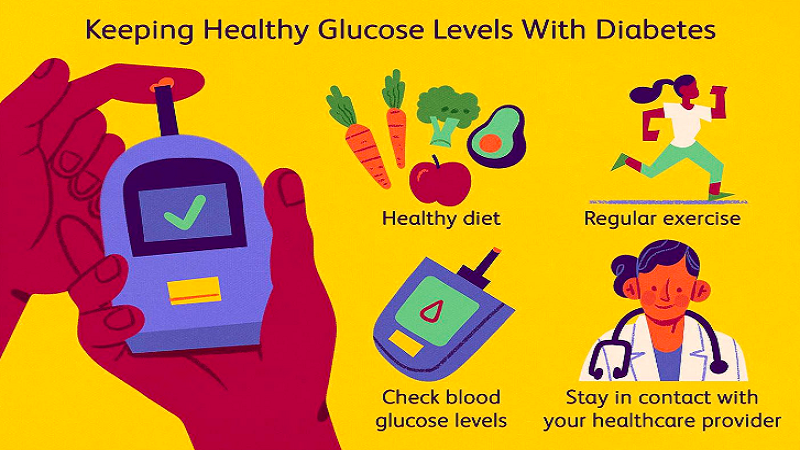Maintaining glucose Top 5 Lifestyle Tips for Promoting Healthy Glucose Levels is very important for overall health and greatly reduces the potential for blood sugar or other metabolic disorders. In light of this, to support healthy glucose levels, balanced nutrition combined with regular exercise is the ideal approach. Whole, fiber-rich foods are incorporated into the diet-vegetables, lean proteins, and complex carbohydrates-which help to level out blood sugar. Refined sugars and processed foods must be lowered for a long-term system of control. Chronic exercise, whether aerobic, walking, or strength training, helps a body build up insulin sensitivity and better control glucose.
Here are the top five lifestyle tips for healthy glucose levels.
1. Regular Physical Exercise
Exercise is one of the best ways to keep glucose levels within the healthy range. When you walk, jog, swim, or do strength training, your muscles use glucose for energy. This helps lower the amount of glucose in your blood.
Regular exercise makes one’s body more sensitive to insulin, meaning that the body can easily handle glucose. On most days of the week, spend at least half an hour doing moderate physical activity. These can range from biking, dancing, or performing household chores, which can help ensure your general fitness and lessen the tendency of the body to accumulate unhealthy glucose levels.
2. Exercise with Balancing Meals Containing High Concentration Fiber Foods
What you consume plays a significant role in how your body will digest glucose. Including fiber-enriched foods regulates glucose levels by slowing down the digestion of sugar, allowing it to enter your blood more gradually. Excellent sources of fiber are whole grains, vegetables, fruits, legumes, and nuts.
Also, supplement this with balanced meals. Protein, healthy fats, and complex carbohydrates help keep glucose levels stable, preventing a spike in insulin after a meal.The spread of meals and snacks throughout the day can also help with the gentle slope of glucose levels.
3. Hydration
Drinking enough water also plays a great role in maintaining Top 5 Lifestyle Tips for Promoting Healthy Glucose Levels. To maintain your blood glucose levels even more naturally, your kidneys flush the excess glucose from the bloodstream into urine. What’s more, drinking water throughout the day will cause you to have less of a chance of having increased sugar cravings or hunger peaks that may make you eat too much.
It is recommended that one drink water or low-calorie beverages like herbal teas. Reducing high-calorie sugary drinks, such as carbonated fizzy drinks, and energy drinks will avoid excessive glycemic and promote overall health.
4. Ensure that you Get Enough Sleep and Manage Stress
This affects the way the body functions best, including how it regulates glucose levels. Low-quality or inadequate sleep can affect the body’s usage of insulin, thus raising glucose levels. Achieving 7-9 hours of uninterrupted sleep at night is great for healthy glucose balance.
Even stress management is equally necessary. Chronic stress raises glucose levels by triggering the release of hormones like cortisol, which disrupts glucose control. Techniques like meditation, deep breathing, yoga, or enjoying hobbies can help manage stress and balance glucose levels.
5. Watch Your Intake and Portions
Knowing what you’re eating and how much of it can really help to change things with regard to how your body handles glucose. Some kinds of foods, especially refined carbohydrates and sweets, speed up the rate at which the sugar level in the blood increases. Controlling portions and choosing more nutrient-dense foods will help in avoiding such spikes.
Complex carbohydrates – whole grains, vegetables, and legumes can also be selected to provide daily sustenance and to help level out energy and glucose fluctuations. In addition to this, eating more often with smaller portions instead of consuming large meals can also help maintain more even glucose levels throughout the day.
Conclusion
Promoting healthy glucose levels is all about balance, and small, consistent lifestyle changes can make a significant difference. By incorporating regular exercise, eating fiber-rich foods, staying hydrated, prioritizing sleep, managing stress, and being mindful of food choices, you can support your body’s natural ability to regulate glucose effectively. If you’d like to know more about the many ways lifestyle factors can influence glucose levels, continue exploring resources that offer additional insights on this topic.






